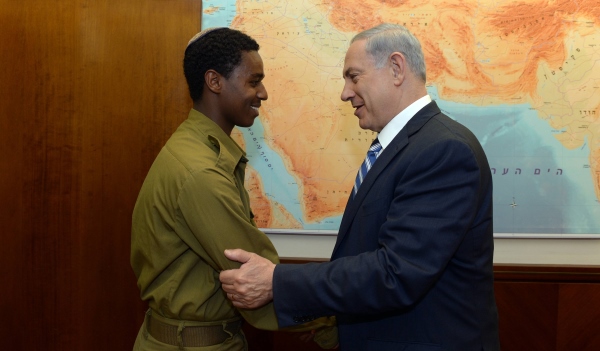Today is יום העצמאות, Independence Day, and I’m reading lots of articles about the significance of an independent Jewish state. “The meaning of independence in my view is, first of all, the ability to defend yourself,” said PM Netanyahu. On the other hand, left-wing journalist Nehemia Shtrasler doesn’t think that Israel is independent at all. “We are no more than an American protectorate,” he argues, because the US could stop selling us weapons and take steps to wreck our economy.
Shtrasler is wrong, because the fact that the US could destroy any country in the world if it cared to doesn’t mean that there are no independent countries. But he is correct that we are far too dependent on the US, something which is being made clear today as we face an unfriendly — arguably, even antisemitic — administration in Washington.
Netanyahu is right that independence requires the capability of self-defense, but of course that is only a necessary condition, not a sufficient one. It is also necessary to have the will to use your capabilities, which in turn depends on the conviction that you are morally justified in doing what is necessary to defend yourself.
This is precisely what is being attacked when Israel is delegitimized and demonized by anti-Zionist groups, NGOs and media. They say that Israel stole its land from the rightful “Palestinian” owners, and that it has neither the legal or moral right to possess it. We are told that Israel’s birth was facilitated by the commission of crimes against humanity, that Israel has continued to commit war crimes in its wars, which are portrayed as offensive and genocidal instead of defensive. Recently, even the pretense that it is only Israel’s presence in the territories that is illegitimate is being abandoned. Every inch of our country is contested.
The so-called “Palestinian narrative” is an example of the Big Lie technique, in which facts and history are inverted and the inversions repeated so often that they become conventional wisdom. ‘Inversion’ is a good word, because it really does turn the truth upside down. In fact, it was Arabs who perpetrated ethnic cleansing and massacres during Israel’s war of Independence, and it is the Jewish people who are truly indigenous to the land of Israel. It is the “Palestinians” who wish to establish an apartheid state, and it is they who target noncombatants and particularly children.
Unfortunately these big lies are effective, even — especially — in Israel, where one would expect that the truth would be more likely to prevail. The myths have become deeply ingrained, even in some of our politicians, even if they don’t realize that they are touched by them.
Self-defense sometimes means deterrence, but sometimes it means war. A political leader or officer in time of war must be able to justify extraordinary actions, actions that he knows will kill people. Some of them will be innocent noncombatants, no matter how careful an army is and how restrictive the rules of engagement — and Israel is very, very careful. Some of them will be our own children, husbands or fathers. Can someone who doesn’t truly believe that his cause is just take such actions?
Confidence in one’s moral and legal position is also required in less lethal pursuits, like diplomacy. Consider the negotiations with the PLO. As I think I’ve written before, the idea of land swaps for settlement blocs implies that the land across the Green Line ‘belongs’ to the Arabs. But anyone who knows the history knows that the Palestine Mandate was intended to provide a national home for the Jewish people, and that the Green Line was agreed by both sides to be nothing more than an armistice line with no political significance. So how did we get the idea that it separates Israel from “Arab land?”
One of the things that distinguishes a protectorate or satellite from an independent nation is that an independent nation has an independent foreign policy and doesn’t simply parrot the party line of its patron. I think this is a good starting point for improving relations with the US: we should try to educate the administration, to the extent that it is possible, about the true legal and historical facts about the State of Israel.
In effect, we need to make a ‘diplomatic declaration of independence’ from the US. Such a declaration would be an important step in reducing our overall dependence on it — and also in improving our ability to defend ourselves. Of course, in order to do this we will need to educate ourselves first, to extirpate the crippling guilt complex that our enemies have succeeded in creating.
One concrete step would be to officially adopt the Levy Commission Report of 2012. The commission, headed by retired Supreme Court Justice Edmond Levy, examined the legal status of the Israeli presence in the territories and concluded that according to international law, Israel is not an occupying power, and the 4th Geneva Convention — the usual basis for the argument that “settlements are illegal” — does not apply. The government took no action on the report. It should.
PM Netanyahu’s statement that there would be no two-state solution in the near future was a breath of fresh air, despite the fact that Obama seized upon it as an excuse to distance the US from Israel. The interminable pointless negotiations with the PLO/PA only served to provide leverage to extract concessions from Israel without any promise of reaching an agreement. As for Obama’s reaction, if Netanyahu hadn’t said it, he would have found another excuse to do what he was determined to do.
There are other things that we can do to increase our independence and improve our ability to defend ourselves. We should try as much as possible to develop our own weapons systems and to integrate systems from other suppliers than the US, so that it would be harder for an unfriendly US administration to cut us off without recourse. We should develop trade with India and the Far East to help offset the damage that a European boycott could cause. But most important, we should remind ourselves of who and what we are, while rejecting the invidious descriptions provided by our enemies.
No, we aren’t a protectorate. Not yet. But to paraphrase Benjamin Franklin, the founders of the State of Israel gave us independence — if we can keep it.






